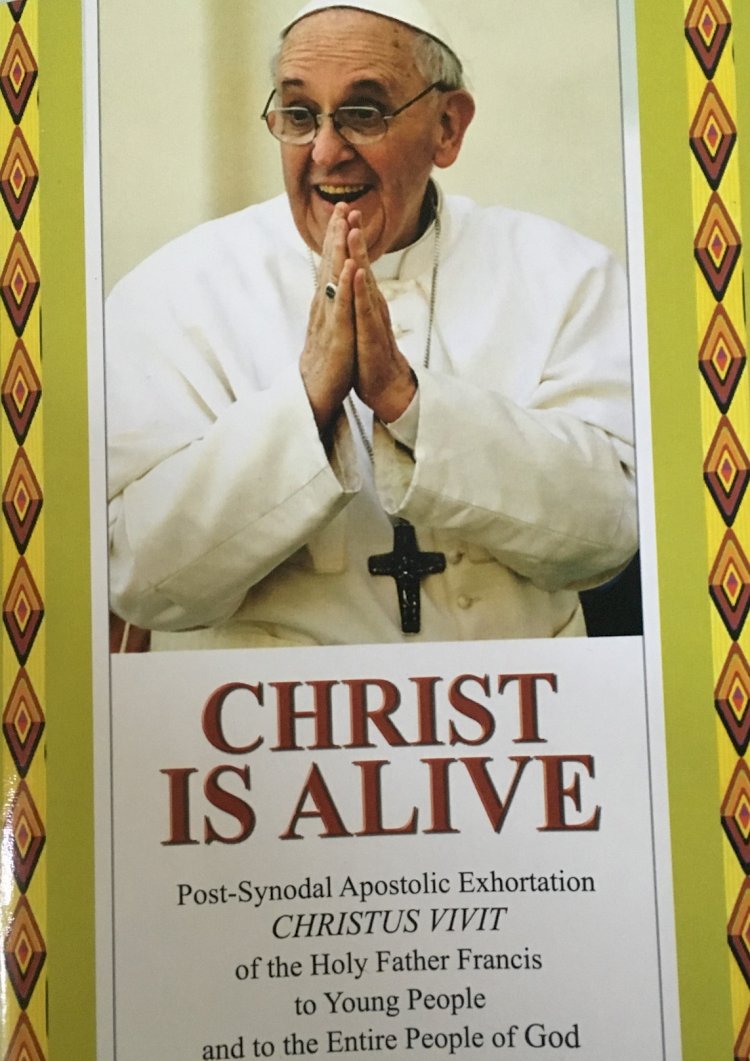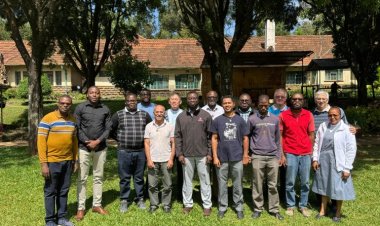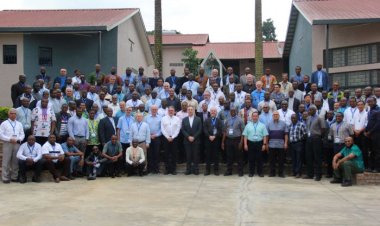Christ is Alive - Chritus Vivit
2019 Letter of Pope Francis to the Youth - abridged for easy reading

POST-SYNODAL APOSTOLIC EXHORTATION
CHRISTUS VIVIT - Christ is Alive
OF THE HOLY FATHER - POPE FRANCIS
TO YOUNG PEOPLE AND TO THE ENTIRE PEOPLE OF GOD
- Christ is alive! He is our hope, and in a wonderful way he brings youth to our world. The very first words, then, that I would like to say to every young Christian are these: Christ is alive and he wants you to be alive!
- He is in you, he is with you and he never abandons you. However far you may wander, he is always there, the Risen One. He calls you and he waits for you to return to him and start over again. When you feel you are growing old out of sorrow, resentment or fear, doubt or failure, he will always be there to restore your strength and your hope.
- Youth is more than simply a period of time; it is a state of mind. That is why an institution as ancient as the Church can experience renewal and a return to youth at different points in her age-old history. Indeed, at the most dramatic moments of her history, she feels called to return with all her heart to her first love. Recalling this truth, the Second Vatican Council noted that, “enriched by a long and living history, and advancing towards human perfection in time and the ultimate destinies of history and of life, the Church is the real youth of the world”. In her, it is always possible to encounter Christ “the companion and friend of youth”.
- Let us ask the Lord to free the Church from those who would make her grow old, encase her in the past, hold her back or keep her at a standstill. But let us also ask him to free her from another temptation: that of thinking she is young because she accepts everything the world offers her, thinking that she is renewed because she sets her message aside and acts like everybody else. No! The Church is young when she is herself, when she receives ever anew the strength born of God’s word, the Eucharist, and the daily presence of Christ and the power of his Spirit in our lives. The Church is young when she shows herself capable of constantly returning to her source.
- The Synod recognized that “a substantial number of young people, for all sorts of reasons, do not ask the Church for anything because they do not see her as significant for their lives. Some even ask expressly to be left alone, as they find the presence of the Church a nuisance, even an irritant. This request does not always stem from uncritical or impulsive contempt. It can also have serious and understandable reasons: sexual and financial scandals; a clergy ill-prepared to engage effectively with the sensitivities of the young; lack of care in homily preparation and the presentation of the word of God; the passive role assigned to the young within the Christian community; the Church’s difficulty in explaining her doctrine and ethical positions to contemporary society”.
- …A living Church can look back on history and acknowledge a fair share of male authoritarianism, domination, various forms of enslavement, abuse and sexist violence. With this outlook, she can support the call to respect women’s rights, and offer convinced support for greater reciprocity between males and females, while not agreeing with everything some feminist groups propose. Along these lines, the Synod sought to renew the Church’s commitment “against all discrimination and violence on sexual grounds”. That is the response of a Church that stays young and lets herself be challenged and spurred by the sensitivities of young people.
- …Young people are no longer children. They are at a time of life when they begin to assume a number of responsibilities, sharing alongside adults in the growth of the family, society and the Church. Yet the times are changing, leading us to ask: What are today’s young people really like? What is going on in their lives?
- The Synod recognized that the members of the Church do not always take the approach of Jesus. Rather than listening to young people attentively, “all too often, there is a tendency to provide pre-packaged answers and ready-made solutions, without allowing their real questions to emerge and facing the challenges they pose”. Yet once the Church sets aside narrow preconceptions and listens carefully to the young, this empathy enriches her, for “it allows young people to make their own contribution to the community, helping it to appreciate new sensitivities and to consider new questions”.
- Anyone called to be a parent, pastor or guide to young people must have the farsightedness to appreciate the little flame that continues to burn, the fragile reed that is shaken but not broken (cf. Is 42:3). The ability to discern pathways where others only see walls, to recognize potential where others see only peril. That is how God the Father see things; he knows how to cherish and nurture the seeds of goodness sown in the hearts of the young. Each young person’s heart should thus be considered “holy ground”, a bearer of seeds of divine life, before which we must “take off our shoes” in order to draw near and enter more deeply into the Mystery.
- …The age group considered by the Synod -16-29 years - does not represent a homogeneous category, but is composed of distinct groups, each with its own life experience”.
- Youth is not something to be analysed in the abstract. Indeed, “youth” does not exist: there exist only young people, each with the reality of his or her own life. In today’s rapidly changing world, many of those lives are exposed to suffering and manipulation.
- “Even more numerous in the world are young people who suffer forms of marginalization and social exclusion for religious, ethnic or economic reasons. Let us not forget the difficult situation of adolescents and young people who become pregnant, the scourge of abortion, the spread of HIV, various forms of addiction (drugs, gambling, pornography and so forth), and the plight of street children without homes, families or economic resources”.[30] In the case of women, these situations are doubly painful and difficult.
- As a Church, may we never fail to weep before these tragedies of our young. May we never become inured to them, for anyone incapable of tears cannot be a mother. We want to weep so that society itself can be more of a mother, so that in place of killing it can learn to give birth, to become a promise of life. We weep when we think of all those young people who have already lost their lives due to poverty and violence, and we ask society to learn to be a caring mother. None of this pain goes away; it stays with us, because the harsh reality can no longer be concealed. The worst thing we can do is adopt that worldly spirit whose solution is simply to anesthetize young people with other messages, with other distractions, with trivial pursuits.
- Perhaps “those of us who have a reasonably comfortable life don’t know how to weep. Some realities in life are only seen with eyes cleansed by tears. I would like each of you to ask yourself this question: Can I weep? Can I weep when I see a child who is starving, on drugs or on the street, homeless, abandoned, mistreated or exploited as a slave by society? Or is my weeping only the self-centred whining of those who cry because they want something else?” Try to learn to weep for all those young people less fortunate than yourselves. Weeping is also an expression of mercy and compassion. If tears do not come, ask the Lord to give you the grace to weep for the sufferings of others. Once you can weep, then you will be able to help others from the heart.
- It is true that people in power offer some assistance, but often it comes at a high price. In many poor countries, economic aid provided by some richer countries or international agencies is usually tied to the acceptance of Western views of sexuality, marriage, life or social justice. This ideological colonization is especially harmful to the young. We also see how a certain kind of advertising teaches young people to be perpetually dissatisfied and contributes to the throwaway culture, in which young people themselves end up being discarded.
- Some young people “find family traditions oppressive and they flee from them under the impulse of a globalized culture that at times leaves them without points of reference. In other parts of the world, even more than generational conflict between young people and adults, there is mutual estrangement. Sometimes adults fail, or do not even try, to hand on the basic values of life, or they try to imitate young people, thus inverting the relationship between generations. …
- … For many people, immersion in the virtual world has brought about a kind of “digital migration”, involving withdrawal from their families and their cultural and religious values, and entrance into a world of loneliness and of self-invention, with the result that they feel rootless even while remaining physically in one place. The fresh and exuberant lives of young people who want to affirm their personality today confront a new challenge: that of interacting with a real and virtual world that they enter alone, as if setting foot on an undiscovered global continent. Young people today are the first to have to effect this synthesis between what is personal, what is distinctive to their respective cultures, and what is global. This means that they must find ways to pass from virtual contact to good and healthy communication.
- “Abuse exists in various forms: the abuse of power, the abuse of conscience, sexual and financial abuse. Clearly, the ways of exercising authority that make all this possible have to be eradicated, and the irresponsibility and lack of transparency with which so many cases have been handled have to be challenged. The desire to dominate, lack of dialogue and transparency, forms of double life, spiritual emptiness, as well as psychological weaknesses, are the terrain on which corruption thrives”. Clericalism is a constant temptation on the part of priests who see “the ministry they have received as a power to be exercised, rather than a free and generous service to be offered. It makes us think that we belong to a group that has all the answers and no longer needs to listen or has anything to learn
- Thank God, those who committed these horrible crimes are not the majority of priests, who carry out their ministry with fidelity and generosity. I ask young people to let themselves be inspired by this vast majority. And if you see a priest at risk, because he has lost the joy of his ministry, or seeks affective compensation, or is taking the wrong path, remind him of his commitment to God and his people, remind him of the Gospel and urge him to hold to his course. In this way, you will contribute greatly to something fundamental: preventing these atrocities from being repeated.
- God is the giver of youth and he is at work in the life of each young person. Youth is a blessed time for the young and a grace for the Church and for the world. It is joy, a song of hope and a blessing. Making the most of our youthful years entails seeing this season of life as worthwhile in itself, and not simply as a brief prelude to adulthood.
- Some young people might hate this stage of life, because they want to continue being children or indefinitely prolong their adolescence and put off having to make decisions. “Fear of the definitive thus generates a kind of paralysis of decision-making. Yet youth cannot remain on hold. It is the age of choices and herein lies its fascination and its greatest responsibility. …
- Dear young people, make the most of these years of your youth. Don’t observe life from a balcony. Don’t confuse happiness with an armchair, or live your life behind a screen. Whatever you do, do not become the sorry sight of an abandoned vehicle! Don’t be parked cars, but dream freely and make good decisions. Take risks, even if it means making mistakes. Don’t go through life anesthetized or approach the world like tourists. Make a ruckus! Cast out the fears that paralyze you, so that you don’t become young mummies. Live! Give yourselves over to the best of life! Open the door of the cage, go out and fly! Please, don’t take an early retirement.
- Clearly, God’s word asks you to enjoy the present, not simply to prepare for the future: “Do not worry about tomorrow, for tomorrow will bring worries of its own; today’s trouble is enough for today” (Mt 6:34). But this is not the same as embarking irresponsibly on a life of dissipation that can only leave us empty and perpetually dissatisfied. Rather, it is about living the present to the full, spending our energies on good things, cultivating fraternity, following Jesus and making the most of life’s little joys as gifts of God’s love.
- Many young people are concerned about their bodies, trying to build up physical strength or improve their appearance. Others work to develop their talents and knowledge, so as to feel more sure of themselves. Some aim higher, seeking to become more involved and to grow spiritually. Saint John said: “I write to you, young people, because you are strong and the word of God abides in you” (1 Jn 2:14). Seeking the Lord, keeping his word, entrusting our life to him and growing in the virtues: all these things make young hearts strong. That is why you need to stay connected with Jesus, to “remain online” with him, since you will not grow happy and holy by your own efforts and intelligence alone. Just as you try not to lose your connection to the internet, make sure that you stay connected with the Lord. That means not cutting off dialogue, listening to him, sharing your life with him and, whenever you aren’t sure what you should do, asking him: “Jesus what would you do in my place?”.
- I hope that you will be serious enough about yourself to make an effort to grow spiritually. Along with all the other exciting things about youth, there is also the beauty of seeking “righteousness, faith, love and peace” (2 Tim 2:22). This does not involve losing anything of your spontaneity, boldness, enthusiasm and tenderness. Becoming an adult does not mean you have to abandon what is best about this stage of your lives. …
- I want to encourage all of you in this effort, because I know that “your young hearts want to build a better world. I have been following news reports of the many young people throughout the world who have taken to the streets to express the desire for a more just and fraternal society. Young people taking to the streets! The young want to be protagonists of change. Please, do not leave it to others to be protagonists of change. You are the ones who hold the future! Through you, the future enters into the world. I ask you also to be protagonists of this transformation. You are the ones who hold the key to the future! Continue to fight apathy and to offer a Christian response to the social and political troubles emerging in different parts of the world. I ask you to build the future, to work for a better world. Dear young people, please, do not be bystanders in life. Get involved! Jesus was not a bystander. He got involved. Don’t stand aloof, but immerse yourselves in the reality of life, as Jesus did”.[92] Above all, in one way or another, fight for the common good, serve the poor, be protagonists of the revolution of charity and service, capable of resisting the pathologies of consumerism and superficial individualism.
- “Where does Jesus send us? There are no borders, no limits: he sends us everywhere. The Gospel is for everyone, not just for some. It is not only for those who seem closer to us, more receptive, more welcoming. It is for everyone. Do not be afraid to go and bring Christ into every area of life, to the fringes of society, even to those who seem farthest away and most indifferent. …
- Don’t think that this mission is soft and easy. Some young people have given their lives for the sake of missionary outreach. Young friends, don’t wait until tomorrow to contribute your energy, your audacity and your creativity to changing our world. Your youth is not an “in-between time”. You are the now of God, and he wants you to bear fruit. …
- Dear young friends, do not let them exploit your youth to promote a shallow life that confuses beauty with appearances. Realize that there is beauty in the labourer who returns home grimy and unkempt, but with the joy of having earned food for his family. There is extraordinary beauty in the fellowship of a family at table, generously sharing what food it has. There is beauty in the wife, slightly dishevelled and no longer young, who continues to care for her sick husband despite her own failing health. Long after the springtime of their courtship has passed, there is beauty in the fidelity of those couples who still love one another in the autumn of life, those elderly people who still hold hands as they walk. There is also a beauty, unrelated to appearances or fashionable dress, in all those men and women who pursue their personal vocation with love, in selfless service of community or nation, in the hard work of building a happy family, in the selfless and demanding effort to advance social harmony. To find, to disclose and to highlight this beauty, which is like that of Christ on the cross, is to lay the foundations of genuine social solidarity and the culture of encounter.
- Along with the stratagems of a false cult of youth and appearance, we are also witnessing attempts to promote a spirituality without God, an affectivity without community or concern for those who suffer, a fear of the poor, viewed as dangerous, and a variety of claims to offer a future paradise that nonetheless seems increasingly distant. I do not want to offer you any such thing, and with great love I urge you not to let yourselves be taken in by this ideology. It will not make you any younger, but enslave you instead. I propose another way, one born of freedom, enthusiasm, creativity and new horizons, while at the same time cultivating the roots that nourish and sustain us.
- In this regard, I would note that “many Synod Fathers coming from non-Western contexts pointed out that in their countries globalization is bringing with it forms of cultural colonization that sever young people from their cultural and religious roots. The Church needs to make a commitment to accompanying these young people, so that in the process they do not lose sight of the most precious features of their identity”.[99]
- Youth ministry, as traditionally carried out, has been significantly affected by social and cultural changes. Young people frequently fail to find in our usual programmes a response to their concerns, their needs, their problems and issues. The proliferation and growth of groups and movements predominantly associated with the young can be considered the work of the Holy Spirit who constantly shows us new paths. Even so, there is a need to look at the ways such groups participate in the Church’s overall pastoral care, as well as a need for greater communion among them and a better coordination of their activities. Although it is never easy to approach young people, two things have become increasingly evident: the realization that the entire community has to be involved in evangelizing them, and the urgent requirement that they take on a greater role in pastoral outreach.
- 204. The young make us see the need for new styles and new strategies. For example, while adults often worry about having everything properly planned, with regular meetings and fixed times, most young people today have little interest in this kind of pastoral approach. Youth ministry needs to become more flexible: inviting young people to events or occasions that provide an opportunity not only for learning, but also for conversing, celebrating, singing, listening to real stories and experiencing a shared encounter with the living God.
- In this outreach, we need to use above all the language of closeness, the language of generous, relational and existential love that touches the heart, impacts life, and awakens hope and desires. Young people need to be approached with the grammar of love, not by being preached at. The language that young people understand is spoken by those who radiate life, by those who are there for them and with them. And those who, for all their limitations and weaknesses, try to live their faith with integrity. We also have to give greater thought to ways of incarnating the kerygma in the language of today’s youth.
- Any educational project or path of growth for young people must certainly include formation in Christian doctrine and morality. It is likewise important that it have two main goals. One is the development of the kerygma, the foundational experience of encounter with God through Jesus’ death and resurrection. The other is growth in fraternal love, community life and service.
- Along these lines, our institutions should provide young people with places they can make their own, where they can come and go freely, feel welcome and readily meet other young people, whether at times of difficulty and frustration, or of joy and celebration. Some of this is already happening in oratories and other youth centres, which in many cases offer a friendly and relaxed setting where friendships can grow, where young men and women can meet one another, where they can share music, games, sports, but also reflection and prayer. In such places, much can be offered, without great expenditure of funds. Then too, the person-to-person contact indispensable for passing on the message can happen, something whose place cannot be taken by any pastoral resource or strategy.
- Schools are unquestionably a platform for drawing close to children and young people. Precisely because they are such privileged places of personal development, the Christian community has always been concerned to train teachers and administrators, and to found its own schools of various kinds and levels. In this field of educating the young, the Spirit has raised up countless charisms and examples of holiness. Yet schools are in urgent need of self-criticism… Some Catholic schools seem to be structured only for the sake of self-preservation. Fear of change makes them entrenched and defensive before the dangers, real or imagined, that any change might bring. A school that becomes a “bunker”, protecting its students from errors “from without” is a caricature of this tendency.
- Many young people have come to appreciate silence and closeness to God. Groups that gather to adore the Blessed Sacrament or to pray with the word of God have also increased. We should never underestimate the ability of young people to be open to contemplative prayer. We need only find the right ways and means to help them embark on this precious experience. When it comes to worship and prayer, “in many settings, young Catholics are asking for prayer opportunities and sacramental celebrations capable of speaking to their daily lives through a fresh, authentic and joyful liturgy”. It is important to make the most of the great moments of the liturgical year, particularly Holy Week, Pentecost and Christmas. But other festive occasions can provide a welcome break in their routine and help them experience the joy of faith.
- Christian service represents a unique opportunity for growth and openness to God’s gifts of faith and charity. Many young people are attracted by the possibility of helping others, especially children and the poor. Often this service is the first step to a discovery or rediscovery of life in Christ and the Church. Many young people grow weary of our programmes of doctrinal and spiritual formation, and at times demand a chance to be active participants in activities that benefit others.
- “Equally significant is the emphasis that young people place on sports; the Church should not underestimate the potential of sports for education and formation, but instead maintain a strong presence there.
- Nature holds a special attraction for many adolescents and young people who recognize our need to care for the environment. Such is the case with the scouting movement and other groups that encourage closeness to nature, camping trips, hiking, expeditions and campaigns to improve the environment. In the spirit of Saint Francis of Assisi, these experiences can be a real initiation into the school of universal fraternity and contemplative prayer.
- These and various other opportunities for evangelizing the young should not make us forget that, despite the changing times and sensibilities of young people, there are gifts of God that never grow old, for they contain a power transcending all times and places. There is the word of the Lord, ever living and effective, the nourishing presence of Christ in the Eucharist, and the sacrament of Reconciliation, which brings us freedom and strength. …
- In addition to the ordinary, well-planned pastoral ministry that parishes and movements carry out, it is also important to allow room for a “popular” youth ministry, with a different style, schedule, pace and method. Broader and more flexible, it goes out to those places where real young people are active, and fosters the natural leadership qualities and the charisms sown by the Holy Spirit. It tries to avoid imposing obstacles, rules, controls and obligatory structures on these young believers who are natural leaders in their neighbourhoods and in other settings. We need only to accompany and encourage them, trusting a little more in the genius of the Holy Spirit, who acts as he wills.
- Instead of “overwhelming young people with a body of rules that make Christianity seem reductive and moralistic, we are called to invest in their fearlessness and to train them to take up their responsibilities, in the sure knowledge that error, failure and crisis are experiences that can strengthen their humanity”.
- The Synod called for the development of a youth ministry capable of being inclusive, with room for all kinds of young people, to show that we are a Church with open doors. Nor does one have to accept fully all the teachings of the Church to take part in certain of our activities for young people. It is enough to have an open mind towards all those who have the desire and willingness to be encountered by God’s revealed truth. Some of our pastoral activities can assume that a journey of faith has already begun, but we need a “popular” youth ministry that can open doors and make room for everyone, with their doubts and frustrations, their problems and their efforts to find themselves, their past errors, their experiences of sin and all their difficulties.
- Room should also be made for “all those who have other visions of life, who belong to other religions or who distance themselves from religion altogether. All the young, without exception, are in God’s heart and thus in the Church’s heart. …
- 236. Youth ministry, when it ceases to be elitist and is willing to be “popular”, is a process that is gradual, respectful, patient, hopeful, tireless and compassionate. The Synod proposed the example of the disciples of Emmaus (cf. Lk 24:13-35) as a model of what happens in youth ministry.
- Various manifestations of popular piety, especially pilgrimages, attract young people who do not readily feel at home in ecclesial structures, and represent a concrete sign of their trust in God. These ways of seeking God are seen particularly in young people who are poor, but also those in other sectors of society. They should not be looked down on, but encouraged and promoted. Popular piety “is a legitimate way of living the faith” and “an expression of the spontaneous missionary activity of the People of God”.
- Here I would point out that it doesn’t take much to make young people missionaries. Even those who are most frail, limited and troubled can be missionaries in their own way, for goodness can always be shared, even if it exists alongside many limitations. A young person who makes a pilgrimage to ask Our Lady for help, and invites a friend or companion along, by that single gesture is being a good missionary. …
- Young people need to have their freedom respected, yet they also need to be accompanied. The family should be the first place of accompaniment. Youth ministry can present the ideal of life in Christ as the process of building a house on rock (cf. Mt 7:24-25). For most young people, that house, their life, will be built on marriage and married love. That is why youth ministry and the pastoral care of families should be coordinated and integrated, with the aim of ensuring a continuous and suitable accompaniment of the vocational process.
- Here, we need to remember that God created us as sexual beings. He himself “created sexuality, which is a marvellous gift to his creatures”. Within the vocation to marriage we should acknowledge and appreciate that “sexuality, sex, is a gift from God. It is not taboo. It is a gift from God, a gift the Lord gives us. It has two purposes: to love and to generate life. It is passion, passionate love. True love is passionate. Love between a man and a woman, when it is passionate, (COMMITTED) always leads to giving life. Always. To give life with body and soul”.
- Today, a culture of the ephemeral dominates, but it is an illusion. To think that nothing can be definitive is a deceptive lie. “Today, there are those who say that marriage is out of fashion… In a culture of relativism and the ephemeral, many preach the importance of ‘enjoying’ the present moment. They say that it is not worth making a life-long commitment, making a definitive decision… I ask you, instead, to be revolutionaries, I ask you to swim against the tide; yes, I am asking you to rebel against this culture that sees everything as temporary and that ultimately believes you are incapable of responsibility, incapable of true love”. I have great confidence in you, and for this very reason, I urge you to opt for marriage.
- Marriage requires preparation, and this calls for growing in self-knowledge, developing the greater virtues, particularly love, patience, openness to dialogue and helping others. It also involves maturing in your own sexuality, so that it can become less and less a means of using others, and increasingly a capacity to entrust yourself fully to another person in an exclusive and generous way.
- I ask young people not to expect to live without working, depending on others for help. This is not good, because “work is a necessity, part of the meaning of life on this earth, a path to growth, human development and personal fulfilment. In this sense, helping the poor financially must always be a provisional solution in the face of pressing needs.
- This is a highly complex and sensitive issue that politics must make a priority, especially at present, when the speed of technological advances and the concern to reduce labour costs can lead quickly to the replacement of many jobs by machines. It is also a crucial societal issue because employment for a young person is not merely a means of making money. Work is an expression of human dignity, a path of development and of social inclusion. It is a constant stimulus to grow in responsibility and creativity, a protection against the tendency towards individualism and personal gratification. At the same time, it is an opportunity to give glory to God by developing one’s abilities.
- Young people do not always have the chance to decide what kind of work they will do, or how their energies and talents will be spent. Because, alongside their own aspirations, abilities and choices, there is the harsh reality of the job market. It is true that you cannot live without working, and that sometimes you have to accept whatever is available, but I ask you never to give up on your dreams, never completely bury a calling, and never accept defeat. Keep seeking at least partial or imperfect ways to live what you have discerned to be your real calling.
- Here we see the importance of the formation of conscience, which allows discernment to grow in depth and in fidelity to God: “Forming our conscience is the work of a lifetime, in which we learn to cultivate the very sentiments of Jesus Christ, adopting the criteria behind his choices and the intentions behind his actions (cf. Phil 2:5)”.
- If you are to accompany others on this path, you must be the first to follow it, day in and day out. That is what Mary did, in her own youth, as she confronted her own questions and difficulties. May she renew your youthfulness by the power of her prayers and accompany you always by her maternal presence.
And to conclude… a wish
299. Dear young people, my joyful hope is to see you keep running the race before you, outstripping all those who are slow or fearful. Keep running, “attracted by the face of Christ, whom we love so much, whom we adore in the Holy Eucharist and acknowledge in the flesh of our suffering brothers and sisters. May the Holy Spirit urge you on as you run this race. The Church needs your momentum (energy), your intuitions, your faith. We need them! And when you arrive where we have not yet reached, have the patience to wait for us”.[164]
Given in Loreto, at the Shrine of the Holy House, on 25 March, Solemnity of the Annunciation of the Lord, in the year 2019, the seventh of my Pontificate.
FRANCIS


















